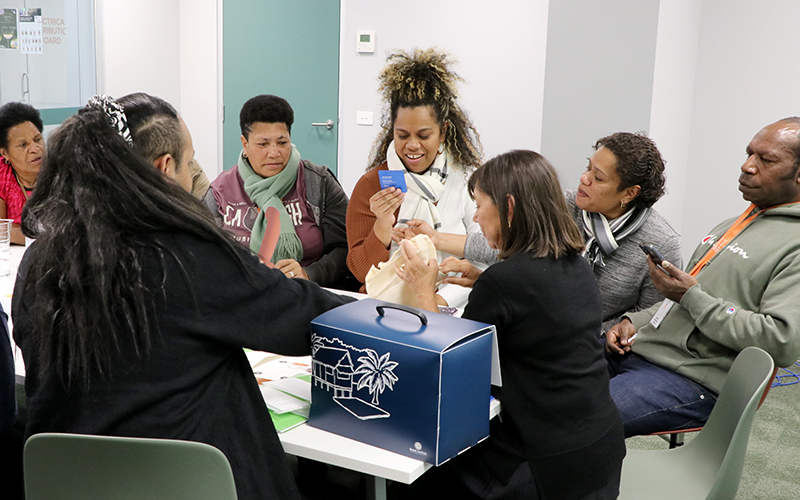
Burnet welcomes back Australia Awards Fellowships delegates
Burnet Institute opened its doors to Australia Awards Fellowships delegates in July after a five-year pause to the program.
Australia Awards Fellowships is an initiative of the Australian Government to build networks of influence and leadership by strengthening partnerships between Australian and partner organisations in the region.
The Institute welcomed 11 delegates from Papua New Guinea and Fiji, who have a range of professional backgrounds, from peer work and community advocacy, to medical personnel and specialist sexual health physicians.
Delegates spent two weeks at Burnet Institute, participating in workshops focused on HIV prevention and health promotion.
Experts from across the Institute ran sessions on harm reduction, community-based testing, and adolescent health. Guest lecturers from affiliated organisations, such as Alfred Health and Murdoch Children’s Research Institute were also involved in some of the sessions.
Delegates visited Burnet’s Australian-based partner organisations including Thorne Harbour Health, Living Positive Victoria, and Sexual Health Victoria, before going on to attend the International AIDS Society conference in Brisbane.
Burnet International Health Project Officer and Australia Awards Fellowship lead for the HIV program Dean Cassano said it was great to be able to host delegates at the Institute again.
“Burnet has a proud history of successfully delivering these programs to help build capacity, strengthen partnerships and contribute to development in the region,” he said.
“The program, Supporting and Strengthening Papua New Guinea and Fiji's Contemporary Responses to HIV, was designed to help our Pacific neighbours who are facing increasing rates of HIV transmission and HIV-related mortality.
“In Fiji, we are now seeing an increase in new HIV cases. Running this program is one way we are supporting our regional neighbours to improve the situation.”
Mr Cassano said the program involved the exchange of ideas and knowledge between the participants.

"We had discussions about Australia's approach to rapid testing, access to pre-exposure prophylaxis (PrEP), and the role of community organisations in our national HIV response. We also had a specific session on First Nations' health and the impact of HIV among First Nations Australians.
“It was energising to have the delegates at Burnet and it also allowed our staff to learn from their experiences and to understand more about the situation in each country, how their health systems operate and how they work at a clinical and community level."
Mr Cassano said biomedical prevention methods – including PrEP, Treatment as Prevention, and PEP (Post-exposure prophylaxis) – would play an important role in reducing HIV cases throughout the region.
“Ensuring people living with HIV have access to treatment and care is essential to minimising its health impact on individuals and reducing the risk of transmission,” he said.
“Australia is one of the first countries to be on track to virtually eliminate HIV transmission, thanks to the role of community organisations in the national HIV response as well as more recent biomedical prevention methods such as pre-exposure prophylaxis.”
Mr Cassano said the delegates were particularly interested in Australia’s approach to adolescent health.
“Delegates said the area of adolescent health was of great interest to them and the work they do with their local communities. They told us they wanted to learn about how to better advocate for adolescent rights in the communities they work with, and to develop more interactive ways of engaging young people in health promotion,” he said.
“They also found it valuable to learn about the programs that community organisations run in Victoria and how these organisations work in partnership with state and national health departments to inform Australia’s HIV prevention and elimination strategies.”
Fijian delegate Dr Kesaia Tuidraki, who works as a physician for a non-government organisation that provides assistance with family planning, reproductive health, and sexual assault, said she learnt a lot from the course.
“We want to ensure there is equitable access to family planning services and to ensure women and men who have experienced sexual assault and gender-based violence have access to the services they require to prevent HIV, sexually transmitted infections and unwanted pregnancies,” she said.
“I’ve learnt a lot from the course at Burnet and it has opened my eyes to the types of programs we could implement in Fiji, especially with regards to HIV awareness and testing.
“The session on adolescent health was particularly interesting. Adolescent and peer counselling is something I would really like to be able to implement at home in Fiji after attending this course.
“I took a lot from the shared learning experience and being able to exchange ideas with my peers from Papua New Guinea and Fiji and from the Burnet staff, it has been an amazing learning experience.”
Burnet plans to apply for more Australia Awards Fellowships next year, covering similar and related themes.




